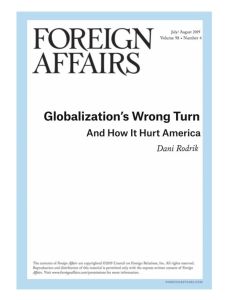Join getAbstract to access the summary!

Join getAbstract to access the summary!
Dani Rodrik
Globalization’s Wrong Turn
And How It Hurt America
Foreign Affairs, 2019
What's inside?
To save the global economy from fragmentation, put national governments back in charge of domestic economic policy.
Recommendation
Globalization, once hailed as an inevitable, unstoppable force that will bring prosperity and freedom to all, is under attack. Yet it is not just populists who rail against the globalist credo. Economists have also started to question the merits of unrestricted global free. In Foreign Affairs, Harvard political economist Dani Rodrik explains what he believes went wrong when policymakers started to accelerate global economic integration in the 1990s – and how international economic institutions can save themselves from themselves.
Summary
About the Author
Dani Rodrik is Ford Foundation Professor of International Political Economy at the John F. Kennedy School of Government at Harvard University.





















Comment on this summary